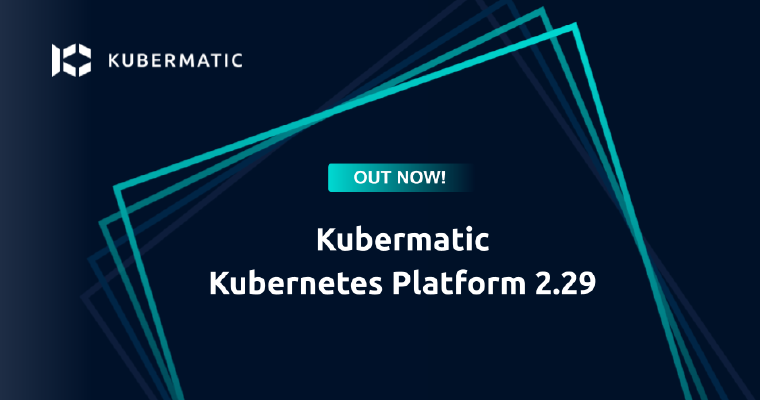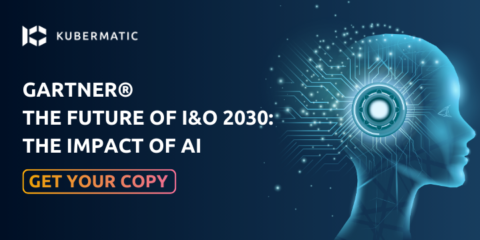
- Introduction
- Features
Freshly Released

Meet KKP 2.29: The next step in making Kubernetes AI-ready
Discover what’s new in KKP 2.29: Making Kubernetes AI-ready, OpenStack integration, and improved security.
Latest Features
AI Power for Infrastructure Operation
KKP leverages AI-driven automation with AI Kit for seamless deployment of AI, GenAI, and LLM workloads at scale, optimizing performance for both CPU and GPU. Additionally, K8sGPT is integrated as a default application and CLI tool within the web terminal, enhancing cluster debugging by bringing AI-powered insights closer to human understanding.
ExploreAutomated Kubernetes Backups
Leveraging Velero and the Kubernetes API, it ensures seamless backup, recovery, and migration across on-premises and cloud environments. With the latest KKP update, users can now restore cluster backups to a completely different KKP instance, providing greater flexibility for disaster recovery, environment transitions, or planned migrations.
Explore
Vanilla Kubernetes
- 100% kubernetes compliant.
- Kubernetes version compliance within 4-6 weeks.
- Support for Kubernetes 1.31 - 1.34, enhancing security and stability.
Multi-tenant Architecture
- Separate cloud providers and preset environments by organizational units.
- Datacenter separation – decide where the data is stored.
- Multi-cluster separation lowers effort for in-cluster policy enforcement.
- Support for Static Labels on Clusters that allows the tagging of immutable metadata to clusters, facilitating more consistent management across multi-cluster environments.
Identity and Access Management
- Streamline authentication and access control, user and team management, enterprise security and operational observability.
- Deploy securely provisioned clusters with blueprints and presets to keep developers within company policies.
- Audit Logging Webhook Backend for improved security and compliance monitoring, which allows routing of audit logs to external systems.
- Enable or disable the "Encryption at Rest" feature on a running user cluster directly from the dashboard.
Automated kubernetes lifecycle management
- Provision, scale, update, and clean up of clusters with just an API call.
- Automatic roll out and roll back of upgrades.
- Templatized workflows for repetitive tasks.
- Migration from Machine-Controller Userdata to OSM, which improves the management of OS-level configurations, resulting in smoother operations.
Backup & Recovery
- Centralized multi-cluster and multi-cloud backup handling- select from daily, weekly, monthly or customized as backup options.
- Customizable backup locations - Multiple backup destinations from the UI Admin Panel.
- Gzip Support for ETCD Snapshots, which optimizes backup storage by reducing the size of snapshots, speeding up the process.
- Enhanced Cluster Backup: Restore to different KKP instances for flexible recovery and migration.
- Upload backup files directly from the UI to your configured S3 bucket for faster recovery workflows.
- Label backup objects with their source to simplify organization and retrieval.
Artificial Intelligence and GenAI for Infrastructure Operation
- Next Level Cluster Debugging with K8sGPT which has been integrated to KKP as a default application and also to the web terminal feature as a CLI tool.
- Effortless Nodes Management with NVIDIA GPU's and other specialized devices through Kubernetes' device plugin framework.
- Flexibility, Automation & Increased Efficiency: AI-Native Infrastructure Platform, specifically designed to utilize AIOps to ensure optimal operator and end-user experiences.
- AI Kit in KKP: Effortlessly deploy AI, GenAI, and LLM workloads with optimized performance for both CPU and GPU workloads. AI Kit simplifies running inference and fine-tuning machine learning models, supports multi-modal models, and provides air-gapped environment compatibility.
- Dynamic Resource Allocation (DRA) is enabled to optimize resource utilization and workload performance.
Free choice of infrastructure stack
- Native support of AWS, Azure, GCP, DigitalOcean, Alibaba Cloud, OpenStack, VMware, Bare Metal Provider Support with Tinkerbell Integration, and more.
- Fast switching between clouds / on-prem by using one common default layer.
Multi-cloud abstraction layer
- Abstract cloud dependencies from the cluster consumer using preset environments.
- Centralized multi-cluster Logging, Monitoring, and Consumption Metering.
Kubernetes Application Management
- Deploy any third-party application on a user cluster, with a few clicks.
- After installation, applications can be reconciled to ensure reliability.
- Default Applications Management for automatically installing preconfigured applications on new clusters, ensuring consistency and reducing setup time.
- Cluster Autoscaler as an Application for flexible scaling management.
Self-service portal
- Deliver Kubernetes-as-a-Service to end users.
- Powerful & intuitive dashboard to visualize Kubernetes deployment.
- Kubelogin kubectl plugin support simplifies authentication workflows.
- Application Catalog supports dynamic version upgrades independent of KKP's release cycle.
Kyverno Integration for Policy Management
- Kyverno integration provides a Kubernetes-native way to define and enforce policies.
- Platform Admins and Project Owners can manage policies directly as Kubernetes resources.
- Default policy templates and UI support make it easy to get started with governance.
CNI: Choose or Bring your Own
- Users can choose between the two most popular CNIs: Canal and Cilium.
- Additionally, users can simply add and manage a CNI of their choice.
- Allow eBPF Proxy Mode When CNI is None, which adds flexibility for handling network traffic when a CNI is not needed.
Single Platform to Manage Virtual Machines on Bare-Metal
- Eliminate the need to run dedicated platforms to manage virtual machines on-premise.
- Provision multiple kubernetes clusters on VMs on-premise with KubeVirt Cloud provider.
- Enhanced multi-tenancy support with a new mode that allocates all KKP resources (e.g., VMs, volumes, load balancers) within a single KubeVirt namespace. This approach improves management and isolation, allowing multiple KKP instances to run on a shared KubeVirt infrastructure.
- Support for vCPU and CPU allocation ratio configuration for KubeVirt VMs for better resource utilization.
Complete Control Over Hybrid & Edge Deployments
- Operating System Manager (OSM) is responsible for creating and managing the required configurations for worker nodes in a Kubernetes cluster.
- Support for Enabling Cloud Drive on OpenStack VMs and Supporting VM Groups in vSphere for enhanced VM management in edge or hybrid environments.
Dual Stack Support
- Kubernetes resources can have both an IPv4 and IPv6 address.
Kubernetes Monitoring Tools
- Monitor health and resource consumption with built-in Prometheus and Grafana.
Full Lifecycle Management
- Upgrade your control plane and nodes without disruption and roll back as you need.
Integrated AddOn Controller
- Easily add any additional software, configuration, or policy into clusters.
- Automate Addon Maintenance, which ensures regular updates to add-ons without manual intervention, enhancing security.
Whitelabel with KKP
- Customize Kubermatic Kubernetes Platform to your brand and needs.
Platform communication
- Admin Announcement Feature: Broadcast messages for maintenance and updates.
If it works with kubernetes, it works with KKP!



